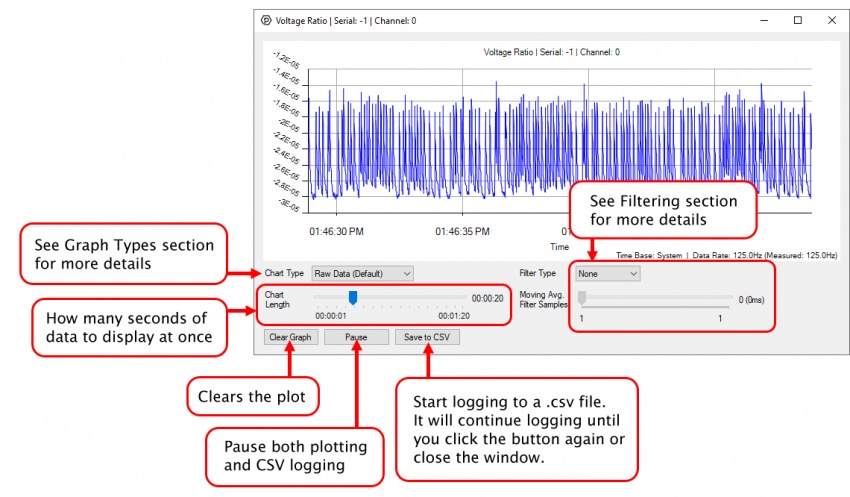Template:UGC-Graphing: Difference between revisions
No edit summary |
No edit summary |
||
| Line 4: | Line 4: | ||
In the [[Phidget Control Panel]], open the channel for your device and click on the [[Image:plot.jpg|link=]] icon next to the data type that you want to plot. This will open up a new window: | In the [[Phidget Control Panel]], open the channel for your device and click on the [[Image:plot.jpg|link=]] icon next to the data type that you want to plot. This will open up a new window: | ||
[[Image:plot2.jpg|link=]] | [[Image:plot2.jpg|link=|850px]] | ||
If you need more complex functionality such as logging multiple sensors to the same sheet or performing calculations on the data, you'll need to write your own program. Generally this will involve [[Addressing Phidgets|addressing]] the correct channel, [[Opening a Channel|opening]] it, and then creating an [[Using Events|Event Handler]] and adding graphing/logging code to it. | If you need more complex functionality such as logging multiple sensors to the same sheet or performing calculations on the data, you'll need to write your own program. Generally this will involve [[Addressing Phidgets|addressing]] the correct channel, [[Opening a Channel|opening]] it, and then creating an [[Using Events|Event Handler]] and adding graphing/logging code to it. | ||
Revision as of 17:16, 19 August 2022
In the Phidget Control Panel, open the channel for your device and click on the ![]() icon next to the data type that you want to plot. This will open up a new window:
icon next to the data type that you want to plot. This will open up a new window:

If you need more complex functionality such as logging multiple sensors to the same sheet or performing calculations on the data, you'll need to write your own program. Generally this will involve addressing the correct channel, opening it, and then creating an Event Handler and adding graphing/logging code to it.
The quickest way to get started is to download some sample code for your desired programming language and then search google for logging or plotting in that language (e.g. "how to log to csv in python") and add the code to the existing change handler.
Filtering
You can perform filtering on the raw data in order to reduce noise in your graph. For more information, see the Control Panel Graphing page.
Graph Type
You can perform a transform on the incoming data to get different graph types that may provide insights into your sensor data. For more information on how to use these graph types, see the Control Panel Graphing page.
